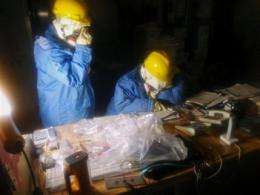Experts: Store blood cells from Japan nuke workers

Workers at Japan's troubled nuclear plant should store blood cells now in case they need them later as treatment for radiation overdose, some Japanese experts suggest.
Plant workers are struggling to control radiation leakage from the Fukushima Dai-ichi complex, which was severely damaged by the March 11 earthquake and tsunami. Radiation levels are dangerously high in some areas of the plant, and the experts note that the work there will take years, posing a risk of accidental exposure.
High doses of radiation can destroy the blood-making cells of the bone marrow, a potentially fatal outcome that can be treated with transplants of blood stem cells. Such transplants are standard therapy now for blood diseases like leukemia. Getting those cells from a donor takes time, and potential incompatibility between the donated cells and the recipient can lead to severe complications, the experts noted.
So they suggest that the plant's workers have their own blood stem cells banked now. That involves getting injections for several days to get stem cells from the marrow to enter the bloodstream. Then blood would be drawn from one arm, processed to extract the stem cells, and returned into the other arm. That takes several hours.
Once the stem cells were stored, any workers who later got accidentally exposed to a large radiation dose could get infusions of their own cells.
The experts, from institutions including Toranomon Hospital and the Japanese Foundation for Cancer Research in Tokyo, discuss the idea in a letter published online Thursday by the journal Lancet.
They noted that reaction to the idea has been mixed since they first raised it last month. Some medical groups have supported it, while other experts have said it would pose an undue physical and psychological burden on nuclear workers, they wrote. In any case, some transplant teams are ready to collect and store the cells, they said.
In a telephone interview with The Associated Press, a U.S. stem cell transplant expert said the idea might have some limited use.
Dr. Nelson Chao of Duke University said the proposal would be reasonable for workers who enter high-radiation zones to clean up the nuclear complex.
But its usefulness would be limited to workers who end up getting radiation doses within a rather narrow range, he said. If they get less than that, they'll recover anyway. If they get more, they'd also sustain lethal and untreatable damage to the gut and other organs including the lung. Stem cell transplants could not help with that, he said.
More information: Lancet: http://www.lancet.com
©2010 The Associated Press. All rights reserved. This material may not be published, broadcast, rewritten or redistributed.















